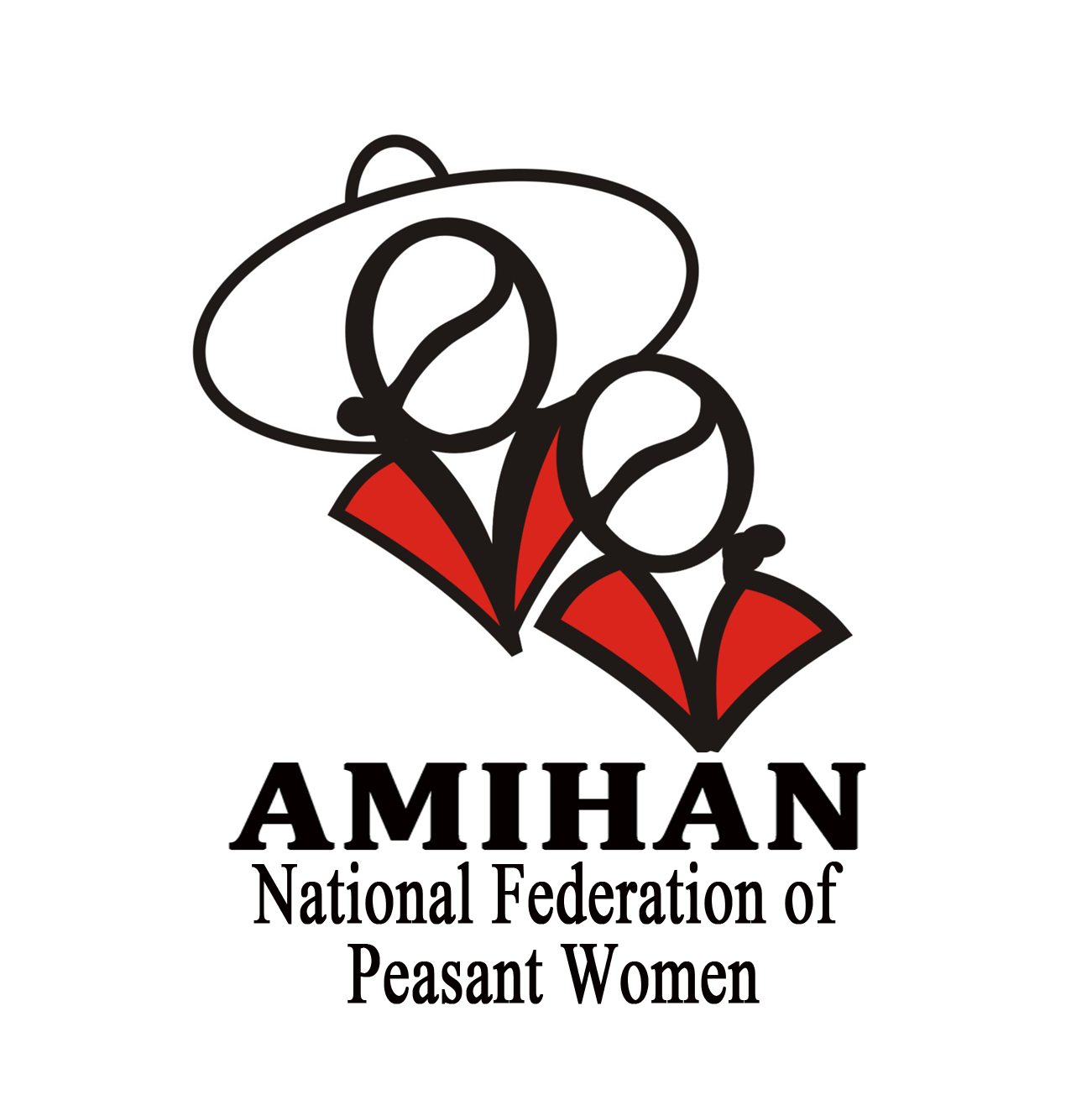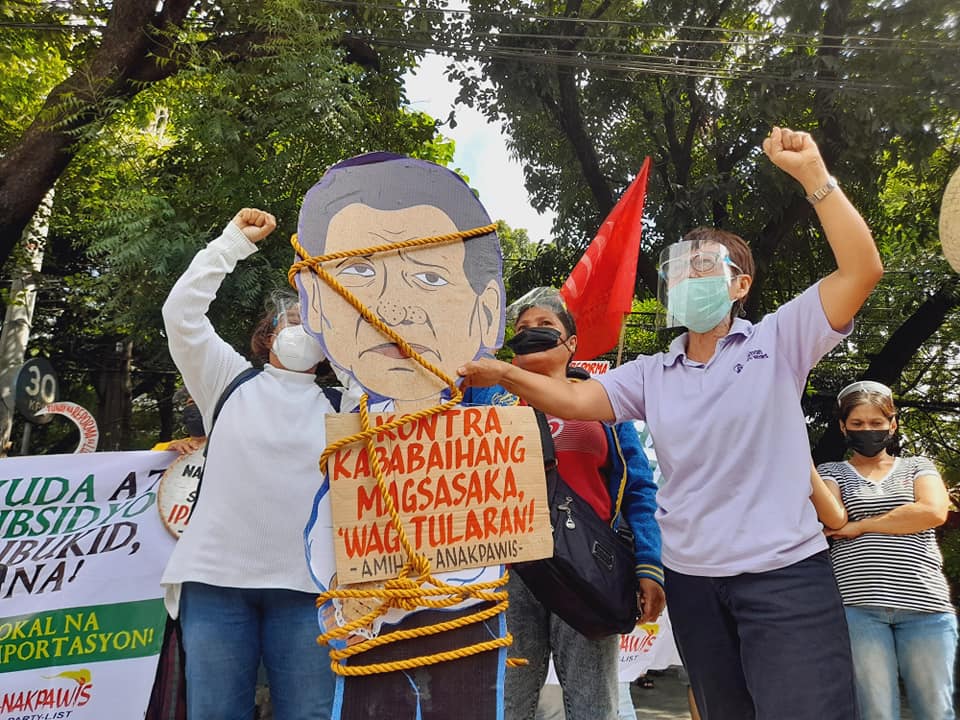Marking the 13th year of the United Nations’ (UN) International Day of Rural Women, peasant women and mothers from Cavite, Rizal and Bulacan provinces, led by the Amihan National Federation of Peasant Women protested in front of the central office of the Department of Agrarian Reform and Department of Agriculture in Quezon City to demand land, aid and justice as land grabbing, rights abuses and worsening socio-economic crisis persist amid the pandemic. The groups were joined by Anakpawis Partylist, Kasama-Lupang Ramos, Kilusang Magbubukid ng Pilipinas, Pamalakaya, Philippine Network of Food Security Programmes (PNFSP) and advocate groups. Moreover, the peasant women group joined the Global Day of Action against the International Monetary Fund-World Bank (IMF-WB) group against corporate capture of agriculture in the Philippines.
“The value of rural women’s work and contribution to agriculture and rural development are paid off by the Duterte government’s anti-peasant programs and policies resulting to landlessness, bankruptcy and displacement,” Amihan and Anakpawis Partylist secretary general Cathy Estavillo said.
“Wala na ngang programa sa reporma sa lupa ang gobyernong ito, lalo pa nitong pinagkaitan ng lupa ang pamilyang magbubukid sa pamamagitan ng DAR Administrative Order No. 1, series of 2019 na nagpabilis sa land use conversion na kadikit ng grandiyoso at balon ng korapsyon na Build, Build, Build,” Estavillo added.
The group noted that even at the height of the militarist lockdown, violent demolition and eviction, threat and harassment of farmers continued in Lupang Ramos and Lupang Kapdula in Dasmarińas, Cavite, Lupang Aguinaldo in Silang, Cavite, San Jose del Monte and Norzagaray, Bulacan, Hacienda Yulo in Calamba, Laguna, Orion, Bataan, Yulo King Ranch in Coron, Palawan, and the ancestral lands of Tumanduk in Panay, Dumagat in Rizal and Lumad in Mindanao.
“In the guise of ‘realizing the completion of the country’s land reform program’, DAR is pushing for the World Bank funded Support to Parcelization of Lands for Individual Titling (SPLIT) Project. Sa realidad, ang paghahati-hati ng mga collective CLOA ay magpapahina sa posisyon ng mga magsasaka sa lupa at maitulak ang mga ARB sa pagpasok sa Agriculture Venture Arrangements (AVAs) at iba pang corporative schemes, maging collateral ang lupa para sa mga proyektong pautang ng gobyerno at magbigay-daan sa muling rekonsentrasyon ng lupa sa kamay ng iilang panginoong maylupa at agrikorporasyon,” Estavillo said.
The P19 billion worth project targets to cover 1.38 million hectares of agricultural land with 1.14 million ARBs from 2020 to 2024.
“Former DAR Secretary John Castriciones is taking advantage of the farmers’ struggle for genuine land reform and social justice by turning CLOA distribution to an electoral campaign sortie through its DAR-to-door program. DAR funds could have been put into better use by helping farmers instead of spending taxpayer’s money for unnecessary tarpaulins and travel expenses,” Estavillo said.
The group also slammed Sec. Castriciones’ seeming disregard in distributing private agricultural lands which comprise 92 percent of DAR’s land acquisition and distribution balance while he is pushing for the joint program with the Department of Human Settlements and Urban Development BALAI (Building Adequate, Livable, Affordable, and Inclusive) Farmers and Farmworkers’ Housing Program.
“Inuna pa ang pangangampanya at ‘pamamahagi’ ng pabahay pero yung pangunahin niyang mandato hindi magawa. Paano makakabayad sa pabahay ang magsasaka kung pinapalayas sila sa lupa at halos walang kinikita sa pagsasaka?” Estavillo exclaimed.
DAR’s housing project is set to be built in 19 sites with partner local government units and will be paid for by the farmer-beneficiaries at P1,475 a month on average, payable in 30 years.
Moreover, DAR has been an instrument of counter-insurgency and red-tagging with over P400 million allocated for its support to NTF ELCAC based on the 2020 Commission on Audit report and the proposed 2022 national budget.
“Punong-puno na ang kababaihan sa kanayunan sa lahat ng kapabayaan at kapalpakan ng rehimeng Duterte. Patong-patong na kahirapan at kagutuman ang nararanasan ng mga ina at kababaihan dahil sa mga neoliberal na patakaran sa agrikultura. Lugi na nga at baon sa utang dahil sa bagsak-presyong produkto, tuloy pa rin ang importasyon ng bigas, karne, gulay at isda, wala pang ayuda para sa mga magsasaka at mangingisda!” exclaimed Estavillo.
The group tied a Duterte standee wearing a placard “Kontra-kababaihang magbubukid, ‘wag tularan!” with a rope to express discontent and demand accountability.
During the protest in front of DA, Amihan reiterated its demand for P15,000 production subsidy for farmers and fisherfolk and strengthen local food production to ensure food security and self-sufficiency instead of dependence on importation.
Estavillo emphasized that genuine land reform is necessary to alleviate poverty and advance rural development. “We are pushing for the enactment of House Bill 239 or the Genuine Agrarian Reform Bill (GARB) to address landlessness and food insecurity through free land distribution and production support.” Peasant women groups in Cagayan, Isabela, Albay, Camarines Sur, Iloilo, Cebu and Bohol also held activities to mark the Rural Women’s Day. UN’s theme for this year is “Rural Women Cultivating Good Food for All.”

